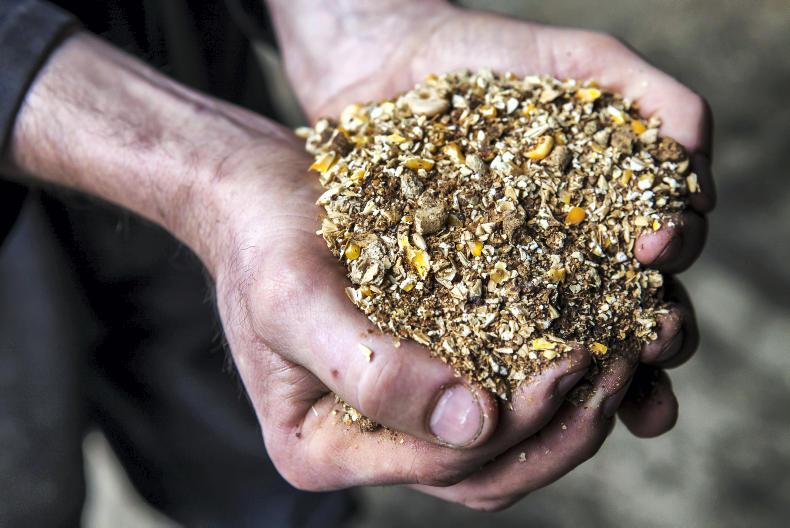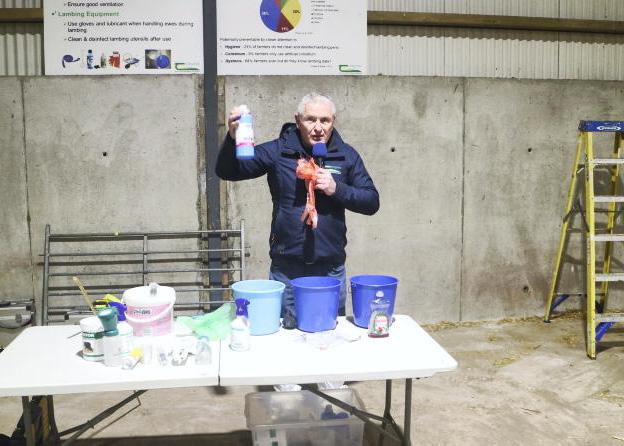Feed merchants are reporting a massive demand from farmers throughout the country struggling with the prolonged spring.
Several merchants have reported a reduction in the number of different lines of feed that they are offering in order to streamline their production.
With grass in short supply and the rain showing no sign of easing off, many farmers have had to buffer their remaining silage in order to keep milk supply up, as well as body condition with the breeding season fast approaching.
So far, prices have not risen, which has helped struggling farmers.
“It would be a bad turn by the industry to think about putting up prices in the current conditions,” according to one prominent feed merchant.
Finisher ration
The general content of the finisher ration for the survey was 30% maize, with protein varying from 12% to 14%. Prices were generally for bulk orders delivered.
A large fluctuation in quotes to farmers has been noted, with as much as €55/t of a difference in finisher rations.
The highest quotes came from merchants in the midlands, with prices ranging from €275 to €285/t. The lowest price was seen in Meath, with prices of €220 to €230/t for a high-maize finishing ration.
Prices quoted in the north were €255/t, while, in the west, they were slightly higher at €265/t. Prices have not moved much over the past month, with similar quotes in March.
Weanling ration
Similar variation was seen for weanling rations, with nearly €60/t of a difference in prices quoted. In general, quotes were received for hi-spec mixes containing 15% to 16% protein.
Highest prices received ranged from €300 to €310/t in the west and the lowest price quoted in the east of €250 to €260/t. Quotes in the midlands saw prices vary between €270 and €285/t, again for bulk loads delivered.
Quality and ingredients for this feed can vary greatly between merchants, so it pays to examine the ingredients in more detail with the aim to purchase a ration that has high quantities of cereals, pulps and distillers, while soya bean meal is the best protein source.
Massive demand has been reported from feed merchants for fodder stretchers such as soya hulls, with many farmers feeding these for the past few weeks in the hope of slowing down the use of silage. Quotes for such a feed were ranging from €210 to €240/t.
Given the close proximity in price to both beef nuts and dairy nuts, farmers would be advised to go for these higher-quality feeds for lactating animals.
Dairy nuts
Prices for a 16% dairy nut have been quoted at €255 to €260/t for bulk orders delivered. Higher energy nuts with a protein content of between 18% and 20% have seen quotes vary from €275 to €300/t.
Quotes for a high-energy nut were generally consistent around the country. The large demand from dairy farmers has seen those with smaller meal bins under pressure.
Ewe nuts
Similarly, prices for ewe nuts are also consistent among merchants, with bulk orders ranging from €265 to €275/t delivered, while orders of small bags are generally €30 to €40/t higher, with prices of €285 to €315/t quoted by several merchants around the country.
Merchants have also reported no problem as of yet for outstanding credit, but they expressed concerns that, in the coming weeks, there may be issues as farmers feel the pinch from having to purchase fodder late in the spring.
Burst in demand for fertiliser looms
Dairygold imports 2,500t of 'essential' fodder
Watch: ‘I have very little feed left’ – farmer makes emotional appeal for help










SHARING OPTIONS